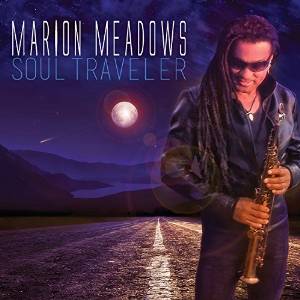Marion Meadows is a classically trained saxophonist who studied at the Berklee College of Music as well as the SUNY system in New York State. However, like so many jazz musicians, Meadows also received his practical education on the road through touring with performers such as Norman Connors and Joe Henderson. Those connections led to steady work as a sideman and eventually to a career as one of the most recognizable artists in contemporary jazz. Meadows has released 13 albums since his 1991 release, For Lovers Only, and that includes his new project Soul Traveler.
Meadows, of course, chose the right instrument to achieve lasting success in contemporary jazz. Saxophone players have been that genre’s biggest and brightest stars going back to the 1970s heyday of Grover Washington, Jr., the artist who probably had more to do with crafting the genre as it exists today than anyone.
Marion Meadows is a classically trained saxophonist who studied at the Berklee College of Music as well as the SUNY system in New York State. However, like so many jazz musicians, Meadows also received his practical education on the road through touring with performers such as Norman Connors and Joe Henderson. Those connections led to steady work as a sideman and eventually to a career as one of the most recognizable artists in contemporary jazz. Meadows has released 13 albums since his 1991 release, For Lovers Only, and that includes his new project Soul Traveler.
Meadows, of course, chose the right instrument to achieve lasting success in contemporary jazz. Saxophone players have been that genre’s biggest and brightest stars going back to the 1970s heyday of Grover Washington, Jr., the artist who probably had more to do with crafting the genre as it exists today than anyone.
Meadows, like many of the contemporary jazz sax players, is a creative and energetic improviser who possesses the ability to launch his sax on flights of fancy on up-tempo and slower tracks alike. He is also comfortable exploring genres such as R&B, hip-hop and funk, and that allows him to make music that appeals to listeners who are not quite ready to immerse themselves fully into straight ahead jazz or the deeper strands of jazz-funk-rock fusion. That’s the territory that the successful contemporary jazz artist must occupy – for better or worse. Meadows has occupied that territory better than many in large part because he combines his creativity with a willingness to be a part of the ensemble. There has been a tendency among some contemporary jazz sax players to create arrangements that sound like they are playing over recorded music. However, Meadows brought in strong players on Soul Traveler and he gives them room to improvise.
Meadows maintains a constant rapport with his bassists throughout Soul Traveler. Bass players such as Chip Shearin on the track “Magic Men” provide the constant bottom that serves as the foundation for solos by Meadows. However, Shearin’s funk-influenced bass playing provides him with opportunities to bring a level of bounce to that foundation. “Andalusian Sunset” finds Meadows engaged in an instrumental conversation with another strong soloist, flamenco guitarist Carlo Pennisi, while the up-tempo “Humanity” finds the soprano sax man trading with pianist Lamar Gaines.
Soul Traveler is an album that will never make it with the purist crowd - who will likely be hard pressed to even call it jazz. Ok, let us take them up on that and call something like instrumental R&B, despite the fact that one of the cuts, “Mother Earth,” includes rapping. Freed from the jazz label, perhaps those purists will be able to accept Soul Traveler as an enjoyable piece of instrumental music that will become the soundtrack for get togethers and romantic get aways. Nah! The purists will never buy it, but plenty of smooth/contemporary jazz or instrumental R&B fans will purchase and enjoy. And that’s what really matters. Recommended.
By Howard Dukes

